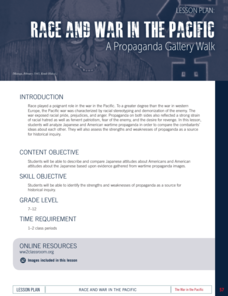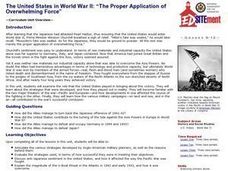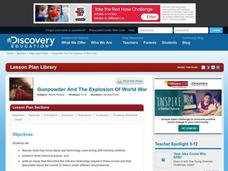National WWII Museum
Race and War in the Pacific: A Propaganda Gallery Walk
Race played a key role in the war in the Pacific during World War II. Using images from both American and Japanese sources, learners consider racial propaganda and how leaders used it to rally popular support during the conflict. After...
EngageNY
Building Background Knowledge: “War in the Pacific,” Part 2
Who did what? Readers take a closer look at War in the Pacific to determine each country's actions. As they read, scholars underline American actions in one color and actions of Japan in another. They then begin completing Pearl Harbor...
EngageNY
Launching The Performance Task: Building Background Knowledge: “War in the Pacific,” Part 1
It's all about a bit of give and take. Scholars silently read War in the Pacific and circle any unfamiliar words. Using context clues, they write each word on a strip of paper along with the inferred definition. After looking the word up...
National WWII Museum
Picturing the War in the Pacific: A Visual Time Line
The Pacific theater was critical to the Allied victory of World War II. Learners deconstruct the sequence of events around the conflict using stunning photographs. After they finish, pupils consider what additional dates and images they...
National WWII Museum
Strategic Decision-Making in the Pacific
Pivotal moments happened in the Pacific Theater during World War II. Some of these turning points were the result of quick decision making, while others were the result of long-term strategies. Scholars evaluate the decisions using...
Curated OER
World War II: The Pacific
Students explore the events in the pacific during World War II. For this World War II lesson, students use reference material to access information about significant locations in the War. Student debate the use of the atomic bomb to end...
National Endowment for the Humanities
How to Win a World War
High schoolers are have begun to learn the art of diplomacy with each other, but do they understand how diplomacy works at a global level? The second in a series of four lessons, guides scholars in evaluating primary sources....
Curated OER
Where in the World War? Mapping WWII in the Pacific
Students explore the Pacific Theatre of War. In this World War II lesson, students use reference material to access information about significant locations in the Pacific Theatre of War. Students identify the locations of the listed...
EngageNY
Connecting Ideas in Primary and Secondary Sources: What Led to the Attack on Pearl Harbor?
Let's make some sense of those thoughts! Scholars continue thinking about the different perspectives on Pearl Harbor. They analyze quotes from War in the Pacific, Day of Infamy, and Fourteen-Part Message. Readers tape each quote to chart...
Alabama Department of Archives and History
Inside the Wire: Internment of Prisoners of War in Alabama during World War II
Create an open environment of discussion and collaboration with several exercises in a thought-provoking resource. Pupils conduct a gallery walk and lead a discussion before filling out a question sheet and chart during the learning...
Curated OER
Turning the Tide in the Pacific, 1941-1943
Students analyze the Japanese strategy for the Pacific and compare it to the Allied strategy. They identify on a map the sites that were important the early war in the Pacific, and identify key military engagements.
Curated OER
"The Proper Application of Overwhelming Force": The United States in World War II
Students examine the role that the U.S. played in bringing about victory in the two major theaters of the war in the Pacific and Europe. How the various military campaigns contributed to the war's successful conclusion forms the focus of...
Roy Rosenzweig Center for History and New Media
War and Poetry
A band of brothers or the Devil's agents? Nobel warriors freeing the oppressed or mercenaries working for the military/industrial complex? Groups examine poems from the Civil War, World War I, and World War II to determine the poets'...
Curated OER
Turning the Tide in the Pacific, 1941-1943
Learners explore the overall strategies pursued by the Japanese and the Allies in the initial months of World War II. What each side hoped to accomplish what what actually happened forms the basis of a comparison made in this lesson.
Curated OER
Countries Involved in World War II
Students create their own floor map of Europe, Northern Africa, and the Pacific. They locate, identify, and speak for one of the countries involved. In addition, they classify the country they represent as an Axis Power or as an Allied...
Curated OER
Victory in the Pacific, 1943-1945
Students examine the military campaigns of the Pacific theater, tracing the path of the Allied offensives. The lesson presents what the Allies were trying to accomplish and why.
Curated OER
Dropping the Atomic Bomb: The Decision That Defined a Presidency
Students interpret historical evidence presented in primary and secondary resources. In this World War II lesson, students research the implications of the use of nuclear weapons to end the war in the Pacific. Students determine...
Curated OER
Victory in the Pacific
Students explore the overall Allied strategy in the Pacific from 1943-1945 and assess its effectiveness. They explore the reasons why the atomic bomb was used and why use of that weapon was controversial.
Curated OER
AMERICAN INVOLVEMENT IN WORLD WAR II: THE PACIFIC THEATER 1941-1945
Tenth graders describe roles of key figures in the Pacific Theater of war during World War II. In this American History lesson plan, 10th graders research key events of the Pacific Theater of War during World War II. Students...
Curated OER
Gunpowder And The Explosion Of World War
Students discover the role of technology in 20th century conflicts. In this technological advancement lesson, students research how World War I, World War II, Vietnam, and the War in Iraq were fought. Students compose essays that...
National Endowment for the Humanities
The New Order for "Greater East Asia"
Sometimes the New Order becomes synonymous with its implications for European countries, but what about its consequences for East Asia? The final instructional activity in a four-part series teaches scholars about World War II. High...
Curated OER
War and Religion
Students analyze perspectives of war. In this war and religion lesson plan, students collaborate to research anti-war and pacifist positions on war as well as "just war" theory. Students compose essays regarding perspectives of war.
Society for Science & the Public
Easter Islanders Made Tools, Not War
When studying artifacts, especially tools, how do archaeologists determine what the devices were used for? In what ways might researchers' previous experiences influence their perception of an artifact? An article about researchers'...
Curated OER
Identifying, Mapping, and Personifying Countries Involved in WWII
Get artsy with this WWII group activity, starting with a whole-class assignment. Create a map of Europe, Northern Africa, and the Pacific using geometric shapes cut from construction paper and placed on the floor. Consider splitting the...























